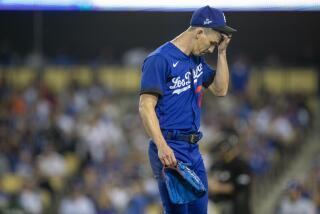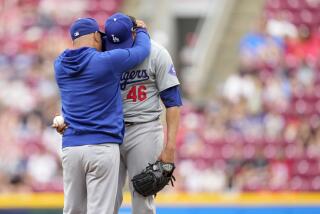Life’s Work
- Share via
ST. PETERSBURG, Fla — ST. PETERSBURG, Fla. -- Sitting in the sun at Al Lang Field, thinking about the events of the last 12 months and the possibility he is on the verge of opening the season in the Tampa Bay Devil Ray rotation, Nick Bierbrodt said he isn’t sure if this is a second chance or something beyond that.
“Just about everything bad that can happen to a professional pitcher and still be alive is the best way I can put it,” Bierbrodt said, contemplating the last year.
Alive and well, a former first-round draft choice of the Arizona Diamondbacks from Long Beach Millikan High, the 24-year-old left-hander cited the events that began in the Devil Rays’ camp last March:
“Lose your control. Lose your job. Get demoted. Get shot. Almost lose your life.”
He paused, catching his breath.
“Now, here I am, back competing, feeling great, no problems,” he said. “I’m pretty lucky and very grateful.”
While losing control and getting shot can finish a pitcher’s career, those two bullets remaining in Bierbrodt’s liver came within millimeters of taking his life. The shooting happened in the early hours of June 7 last year in Charleston, S.C. Bierbrodt had returned to the mound with the Devil Rays’ Class-A affiliate the night before, after spending two months at the St. Petersburg training complex working to regain the control he had lost in March.
He was happy to be back in uniform, excited to have resumed his career and was sitting in the back seat of a taxi with Charleston teammate John Vigue at a drive-through restaurant when he became engaged in an argument with a man on a bicycle. Bierbrodt said he had never seen him before, had no idea who he was and still doesn’t. He wouldn’t be specific about the argument -- “It was just personal stuff,” he said -- but the police report indicated that Bierbrodt had complained about the volume at which the man was playing music on a radio or recorder of some type.
The verbal exchange was brief.
“I remember seeing him pull out a gun, heard two shots, looked down and saw blood on my arm and told the cabbie to get me to a hospital,” Bierbrodt said.
“I remember arriving at the emergency room, but after that it’s a little blurry. I woke up three or four days later, two or three surgeries later.”
One bullet had pierced his right arm, the other his chest. Both lodged in his liver. Surgeries were needed to repair holes in the liver and diaphragm. Tubes drained fluid from his lungs, and doctors told him it would be too damaging to try to remove the bullets and that his body would naturally protect against them.
“They also told me that another millimeter and I would have been dead,” he said. “It was as close as you could come.”
Bierbrodt’s parents, girlfriend and agent flew in to support him, and Bierbrodt said he wasn’t so much interested in hearing how close he had come to dying but how soon he come resume his career. He was released after nine days, was playing catch in October and there have been no further ramifications from the shooting.
“The only time I think about it is when I look in the mirror and see the scar,” he said. “It bothers me that the guy hasn’t been caught and punished, but not from a standpoint that I’m looking over my shoulder or waking up at night thinking about it. I sleep very well.”
Bierbrodt now lives in Tierra Verde, Fla., but he retains a measure of California cool and is even said to joke about the shooting at times. He also seems to have put the control problem to bed and may be back on a course the Diamondbacks envisioned when they made him the first player to be drafted in club history, two years before the major league team played its first game in 1998.
Although that California cool troubled the Diamondbacks at times, according to club officials, his potential and progress resulted in brief major league stints in 2000 and 2001 before the Diamondbacks, desperate to find immediate rotation help for Randy Johnson and Curt Schilling, traded him to Tampa Bay on July 25, 2001, as part of a four-player deal for pitcher Albie Lopez.
Bierbrodt was 3-4 with a 4.55 earned-run average in 11 starts for the Devil Rays at the end of that season and was penciled into the rotation last spring when his control evaporated in the manner of Mark Wohlers and Rick Ankiel. In a span of 1 2/3 innings over two games, he walked 12 of 20 batters and missed on 61 of 86 pitches.
The Devil Rays optioned him to triple A and kept him in extended spring.
“I couldn’t have been throwing the ball any better, then I suddenly couldn’t throw strikes,” he said. “It was pretty deflating and I beat myself up pretty badly trying to figure out what was wrong. I had to go back to ground zero mechanically, but by the time I went to Charleston I felt confident again and that the problem was behind me.”
Bierbrodt has made four appearances this spring without major control lapses. He made only that one appearance at Charleston last year and hasn’t pitched in a regular-season major league game for almost 18 months, but the Devil Rays -- going young and younger -- are counting on him to throw strikes.
And Bierbrodt is hoping people will stop regarding him as something of a curiosity.
“I’m hoping that once the season starts people will forget about the shooting and focus on how I’m pitching,” he said. “That’s the way I want it.”
More to Read
Go beyond the scoreboard
Get the latest on L.A.'s teams in the daily Sports Report newsletter.
You may occasionally receive promotional content from the Los Angeles Times.










